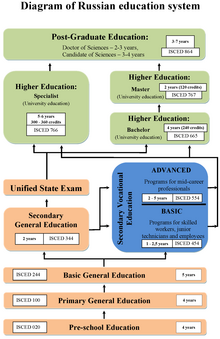| This article needs additional citations for verification. Please help improve this article by adding citations to reliable sources. Unsourced material may be challenged and removed. Find sources: "Russian studies" – news · newspapers · books · scholar · JSTOR (August 2007) (Learn how and when to remove this message) |

Russian studies is an interdisciplinary field crossing politics, history, culture, economics, and languages of Russia and its neighborhood, often grouped under Soviet and Communist studies. Russian studies should not be confused with the study of the Russian literature or linguistics, which is often a distinct department within universities.
In university, a Russian studies major includes many cultural classes teaching Russian politics, history, geography, linguistics, Russian language, literature, and arts. Mysticism and folklore are commonly studied, the introduction of Christianity, rule under the tsars and expansion of Russian empire, later rule under communism, history of the Soviet Union, and its collapse and studies about present-day Russia.
Russian studies rose in prominence during the Cold War, but experienced a decline after the collapse of the Soviet Union. Aggressive behavior by Russia, particularly its invasion of Ukraine, led to increased attention to Russian studies and a reevaluation of its precepts in terms of decolonization.
History
In the year 1897, During the last Emperor's reign of Russia, Czar Nikolai II implemented the public school system in Russia that had a population of 125 million people, but only around 26.5 million were literate in reading or writing. After his reign was over, Joseph Stalin took position of leader of the Soviet Union in the 1930s. He emphasized the industrialization of reform and need for engineers and scientists, which have led to Russia now being in the top 5 countries to rank #1 in Physics regional research reputation. The reform of their education system came from being 21.2% literate to 99.69% in 2021.
See also
- Area studies
- Kremlinology
- List of Russian studies centers
- Russian culture
- Slavic studies
- Byzantine studies
- Education in Russia
References
- Rosenberg, Dina; Tarnikova, Eugenia (2022). "How the internet and social media reduce government approval: empirical evidence from Russian regions". Post-Soviet Affairs. 39 (3): 121–154. doi:10.1080/1060586X.2022.2142427. ISSN 1060-586X. S2CID 253536013.
- Kuzio, Taras. "Crisis in Russian Studies? Nationalism (Imperialism), Racism and War". E-International Relations. Retrieved 2023-04-24.
- Prince, Todd (2023-01-01). "Moscow's Invasion Of Ukraine Triggers 'Soul-Searching' At Western Universities As Scholars Rethink Russian Studies". Radio Free Europe/Radio Liberty. Retrieved 2023-04-24.
- Smith-Peter, Susan (2022-12-14). "How the Field was Colonized: Russian History's Ukrainian Blind Spot". H-Net. Retrieved 2023-04-24.
- Cherkasov, Aleksander A. (September 2011). "All-Russian Primary Education (1894–1917): Developmental Milestones" (PDF). Social Evolution & History. 10 (2): 149 – via Sochi State University.
- "Joseph Stalin", Misplaced Pages, 2024-05-04, retrieved 2024-05-07
- Gory, Leninskie. "Lomonosov Moscow State University".
- "Literacy Rate in Russia (2010-2021, %)".
External links
- Russian Studies at Petrozavodsk State University
- Russian Studies / University of Helsinki
- "Russia, Eastern Europe, and Eurasia: A Research Guide". Princeton LibGuides. US: Princeton University Library.
- "Russian and East European Studies". Research & Subject Guides. Washington, DC: Georgetown University Library.
- "All-Russian Primary Education (1894-1917): Developmental Milestones" Sochi State University https://www.sociostudies.org/journal/files/seh/2011_2/138-149.pdf
This article relating to education is a stub. You can help Misplaced Pages by expanding it. |
This article about Russian culture is a stub. You can help Misplaced Pages by expanding it. |